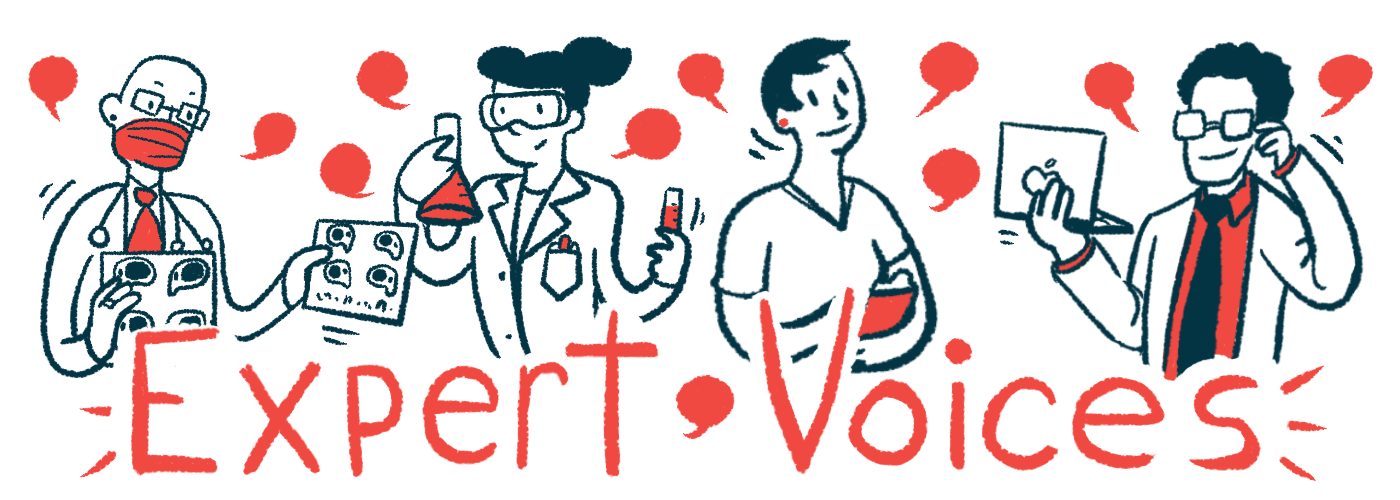Expert Voices: Improving multiple sclerosis patient-provider relationships
Written by |

In this installment of our “Expert Voices” series, Multiple Sclerosis News Today asked Annie Brewster, MD, to answer some of your questions about navigating difficult patient-provider relationships.
Brewster is an assistant professor at Harvard Medical School and a practicing internist at Massachusetts General Hospital in Boston. She is also a patient, living with MS since 2001. She founded Health Story Collaborative, a nonprofit that empowers patients in healthcare settings through storytelling. She also is the co-author of the new book “The Healing Power of Storytelling: Using Personal Narrative to Navigate Illness, Trauma and Loss” (2022).

Annie Brewster, MD, is both a physician and an MS patient. (Photo courtesy of North Atlantic Books)
Since your multiple sclerosis diagnosis, how has your perspective on patient-provider relationships shifted?
When I was diagnosed with MS, I had just graduated from medical school and was in the middle of my residency training. As a young doctor, I would have said that I believed in nurturing positive relationships with my patients. Indeed, it was the promise of such relationships that drew me to medicine as a profession. But I didn’t really “get it” until I became a patient myself.
As a doctor, I had never really understood what it means to receive a life-changing diagnosis. I thought I did, but I didn’t. I was superficially focused on the logistical challenges of managing a health condition, but I completely overlooked the deeper implications.
Medical care is often framed as a detective hunt, a mystery to be solved. When a diagnosis is reached, doctors experience a sense of closure. End of story. In fact, for the patient, the story is just beginning.
Being a patient has made me a much better doctor. As doctors, we are often with patients in vulnerable, turning point moments, such as when news of a life-changing medical diagnosis is delivered. How we behave in these moments matters.
We become a character in each patient’s story, and we will impact how that story unfolds from that moment. This is a responsibility, but also a privilege and an opportunity. I now clearly understand that a doctor’s job is not simply to diagnose and “manage” diseases, but rather to partner with patients in the ongoing journey of navigating illness.
Being a patient has also taught me to bring more humility to my medical practice. While it is my job as a doctor to share my knowledge and offer guidance, I now understand that the patient is always right. As a doctor, I need to honor and support my patients in their decisions, even if I might make a different choice.
I have learned to be honest and straightforward, but to always leave space for hope and mystery; to support and guide, but not to direct. Ideally, patient-provider relationships are partnerships grounded in mutual respect.
A quote from Paul Kalanithi in his book “When Breath Becomes Air” resonates: “The physician’s duty is not to stave off death or return a patient and family to their old lives, but to take into our arms a patient and family whose lives have disintegrated and work until they can stand back up and face, and make sense of, their own existence.”
Do you have a story of a moment that changed your view on patient-provider dynamics?
In 2009, in my role as a doctor, I found myself having to deliver the news of an MS diagnosis to a 30-year-old patient. She was distraught, in tears, convinced that her life was over. She would never work. She would never get married and have children. She would be limited and diminished.
In that moment, I made an offering: “I have MS myself,” I told her. “I work. I have four children. I run, ski, and play hockey. My future is uncertain, and this is scary, but there is room for hope.” She was so relieved! In that moment, she went from feeling defeated to glimpsing possibility.
While I know that my sharing was the most healing thing I had to offer in that moment, in revealing personal information, physician to patient, I had crossed a line. I did so intentionally, in an effort to bring compassion to our exchange, but such border crossings are taboo within medicine.
In our training, we are encouraged to cultivate empathy and connection with our patients — make eye contact, lean in when we listen, reflect back what we have heard, and so on, but at the same time, we are taught to keep an emotional distance.
The preservation of professional boundaries is essential to quality care. I don’t disagree with this entirely — we never want to burden patients with our personal details — but true objectivity is a myth. We are human beings, and our personal experiences are at play in all of our interactions.
Since I have become a patient myself, I have become less rigidly boundaried as a physician. I am more willing to share my own life with my patients. I see our shared humanity more clearly. I believe wholeheartedly that I can be a feeling, human doctor and still make sound medical decisions.
What types of conversations do you think there should be more of between patients and physicians?
There should be more conversations, period. Sadly, office visits often do not leave enough time for doctor and patient to converse. Studies show that when patients speak, physicians interrupt them within 11 seconds on average. Appointments are time constrained, and doctors are taught to narrow in on a diagnosis and manage disease, to control the conversation instead of letting it unfold naturally.
Doctors don’t always listen well. This has to do with the limitations of the system (namely lack of time) and with the way doctors are trained. In medical education, we need to put more value on patient stories and on quality listening. Learning about our patients as human beings should be a priority.
Are there questions you think more doctors ought to have in their tool belt when guiding a patient through difficult discussions, such as a diagnosis?
- What is most important to you right now?
- What do you value most?
- What does a good day look like to you?
- What do you hope for?
- What scares you the most?
- What do you do for self-care?
- Do you have people in your life who care for you? If so, who are they?
In what ways would you improve training for doctors to help them assist patients in processing difficult news in healthcare settings?
I would bring more patient voices into the training. We should consider patients the experts on their medical conditions and truly listen and learn from them. While some of this exists in medical education, it’s not enough. We need more.
For example, it would be helpful to hear patients with a particular diagnosis dialogue together, so that doctors can learn more about the variability of different disease entities and about varied patient perspectives.
As an example, I am now part of a webcast series called MS Confidential that features four individuals (I am one of them) living with MS. Each episode has a theme — for example, hope — and we engage in candid conversations about what the theme means to each of us. Our viewpoints are varied and it contextualizes the MS experience.
I feel strongly that doctors-in-training should be exposed to such conversations. It should be a required part of the curriculum.
What advice would you give to a patient who feels they are not seen or heard by a doctor?
If it happens once, perhaps give the doctor a second chance. Maybe the doctor is having a particularly busy and/or stressful day. If it happens a second time, consider bringing it up directly to let the doctor know how you feel, assuming the relationship with this particular physician feels important to you. If the response is disappointing, or if you decide bringing it up isn’t worth it to you, then find another doctor. You deserve to feel seen and heard!
If a patient experiences difficult emotions in the healthcare setting — like dread, anxiety, or shame — what are good ways to approach the sharing of these discomforts with doctors?
If such feelings arise, I suggest addressing them directly with your doctor. From a practical standpoint, we are never going to get what we need if we suffer in silence. As patients, we need to advocate for ourselves. This can be challenging in the context of our medical system, where the power dynamic privileges doctors and face-to-face time between patient and provider is so limited.
But we need to believe that our personal experience matters, and that we, as patients, are the true experts when it comes to our health and well-being. If your doctor doesn’t respond well, find a new doctor.
You’ve done a lot of work in promoting the power of storytelling. How can stories improve patient-provider relationships?
Patient-provider relationships are strained in today’s healthcare system, but it is my belief that storytelling can begin to heal this rift. Ideally, we create more time and space for story exchange within medical appointments, with a focus on encouraging providers to prioritize listening to and honoring patient stories.
Such sharing would undoubtedly strengthen patient-provider relationships, and ultimately improve healthcare by building a foundation of trust. Unfortunately, time limitations inherent in the current medical system make this type of communication very rare.
At Health Story Collaborative, the nonprofit I run, we have intentionally created a safe space outside of the exam room for patients and providers to come together to share and witness one another’s personal narratives. These events are called Healing Story Sessions, each featuring a patient speaker and a provider speaker who has been involved in the care of the patient. Our goal is to create a forum where both patient and provider can be human.
In preparation, we work with each speaker individually to construct an empowering, authentic narrative using our research-based narrative guides. These events are powerful. They challenge the status quo by breaking down some of the traditional boundaries between patient and provider (discussed above), though we do this with care and thoughtfulness in a contained setting.
We never want the patient to feel burdened by learning personal details about a provider’s life and we are always mindful of this. In my experience, patients love hearing from their provider as a human being. I know I do!
What I love most about these events is that the sharing changes the relationship going forward, typically in very positive ways. Through story sharing, trust and communication are enhanced. Uniformly, the patients and providers we have worked with have valued this experience tremendously.
Expert Voices is a monthly series involving a Q&A with an expert in the MS space about a specific topic. These topics and questions are curated from a survey in which we ask readers what they want to learn more about from experts.
Multiple Sclerosis News Today is strictly a news and information website about the disease. It does not provide medical advice, diagnosis, or treatment. This content is not intended to be a substitute for professional medical advice, diagnosis, or treatment. Always seek the advice of your physician or other qualified health provider with any questions you may have regarding a medical condition. Never disregard professional medical advice or delay in seeking it because of something you have read on this website.


